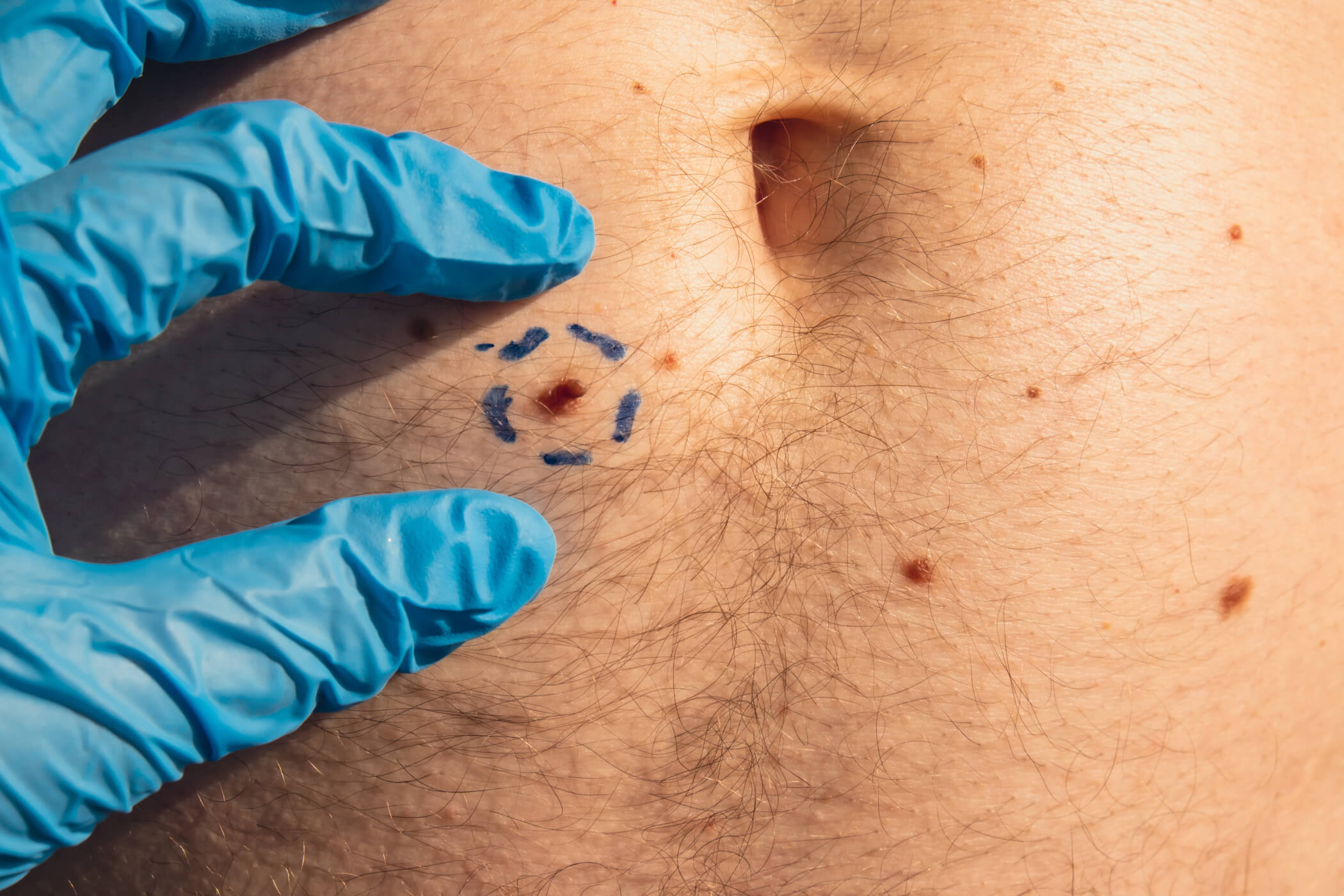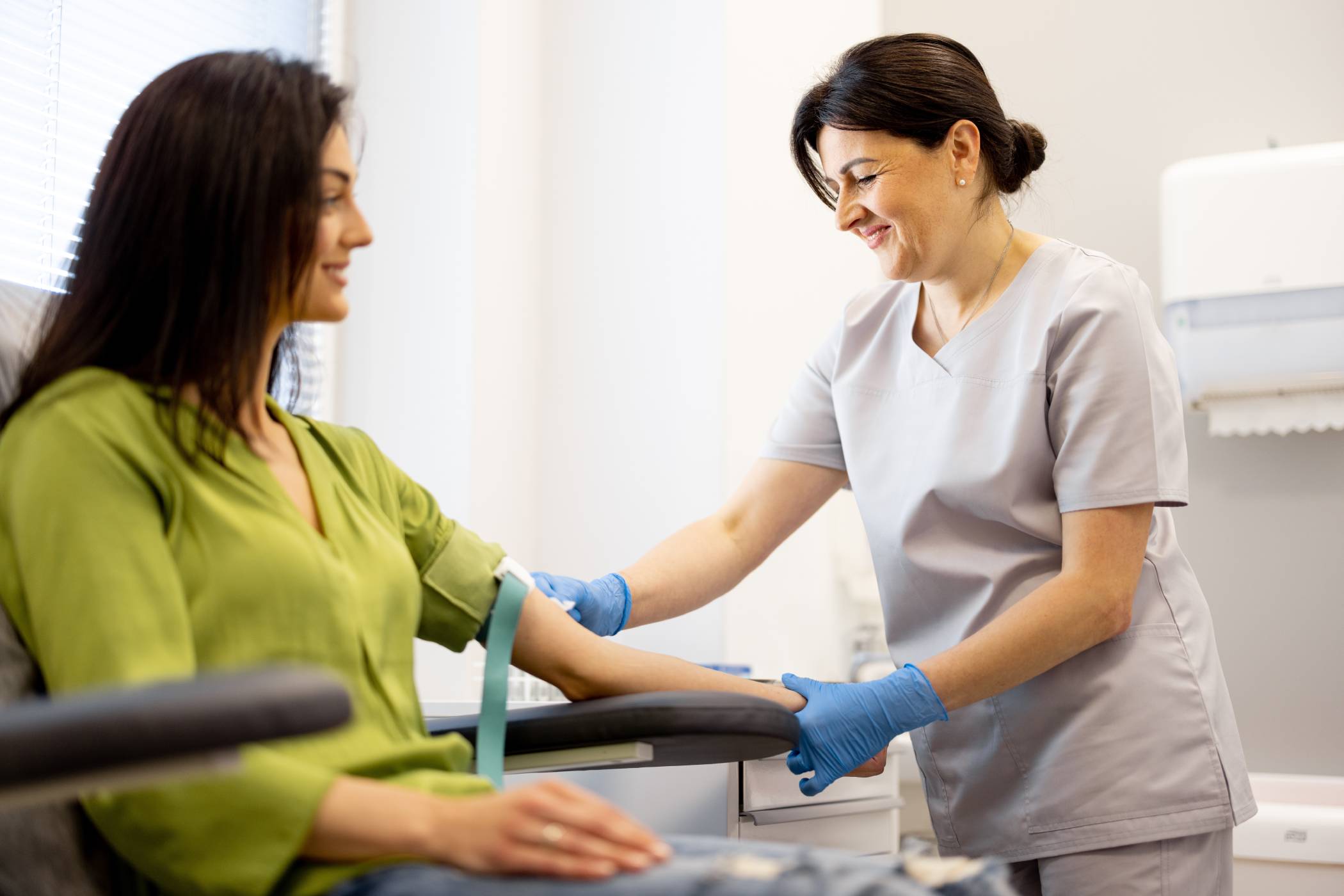Heart health concerns affect millions of people across the UK, with cardiovascular disease remaining one of the leading causes of death. The British Heart Foundation provides extensive information about ECGs and their importance in heart health monitoring. Whether you’ve been experiencing chest pain, irregular heartbeats, or your doctor has simply recommended routine heart monitoring, understanding what an ECG is and what it involves can help put your mind at ease and ensure you get the most from this important test.
But, what is an ECG? An ECG, or electrocardiogram, is one of the most common and valuable tools doctors use to assess heart health. If you’re considering a private GP appointment in Milton Keynes to discuss heart concerns or need quick access to ECG testing, understanding this procedure can help you make informed decisions about your healthcare.
Everything you need to know about ECGs will be covered in this extensive guide, including what they are, what they show, how long they take, and what to anticipate both before and after the test. This article will provide you all the information you need, whether you’re getting ready for your first ECG or you just want to learn more about this vital heart monitoring instrument.

What Is An ECG? Know Your Heart Health
Understanding ECGs is crucial because these tests can be life-changing for those who need heart monitoring or diagnosis. They provide vital information about your heart’s health, explain concerning symptoms, and open the door to effective treatments and ongoing care. Getting an ECG also means access to peace of mind and early detection of potential heart problems.
Understanding the ECG process is important because heart conditions affect everyone differently, and the testing journey can vary depending on your symptoms, age, and health circumstances. This comprehensive guide will walk you through everything you need to know about ECGs and heart monitoring in the UK.
- What Is An ECG?
- What Is The Difference Between An EKG And an ECG?
- What Does An ECG Show?
- What Information Does An ECG Give About A Person?
- How Long Does An ECG Take?
- How To Sleep With A 24-Hour ECG
- Frequently Asked Questions About ECGs
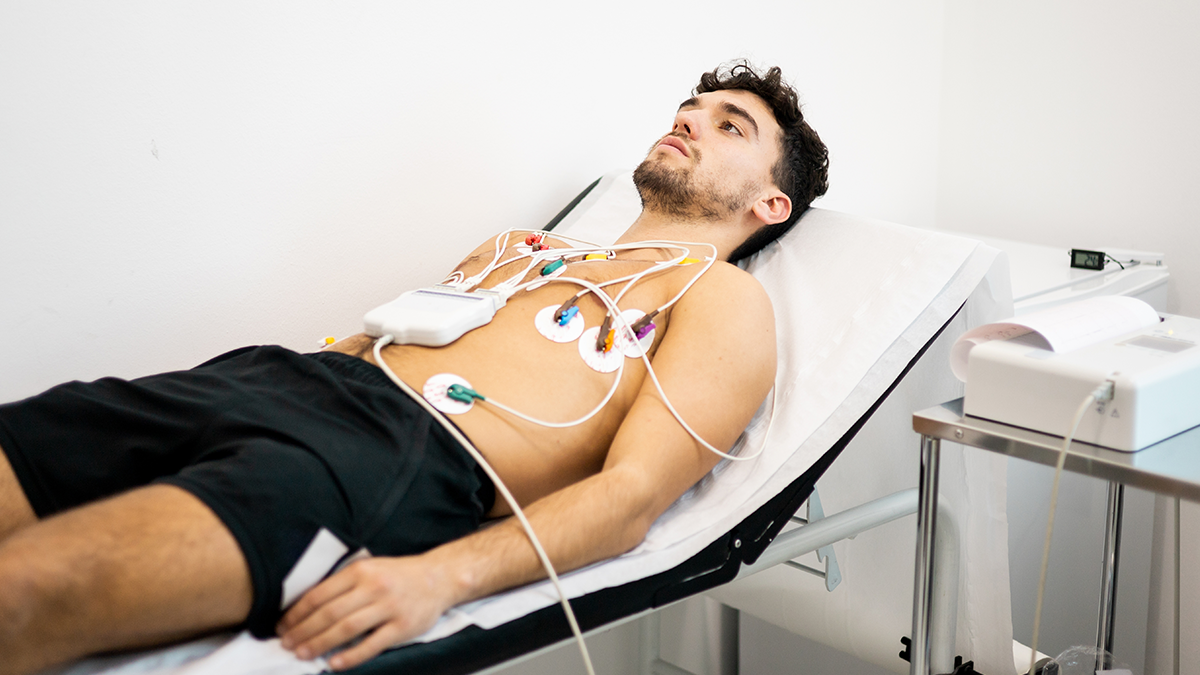
What Is An ECG?
An ECG (electrocardiogram) is a common test that checks the heartbeat and measures the electrical activity of your heart. The NHS provides comprehensive information about ECGs, explaining that the letters “ECG” come from the original German term “elektrokardiogramm,” which is why you’ll sometimes see the same test referred to as an EKG – both terms mean exactly the same thing and are used interchangeably by healthcare professionals.
During an ECG, small plastic patches called electrodes are placed at specific locations on the chest, arms, and legs. When these electrodes are connected to an ECG machine by lead wires, the electrical activity of the heart is measured, interpreted, and printed out.
Every time your heart beats, it produces a small electrical signal that spreads through the heart muscle, causing it to contract and pump blood around your body. An ECG detects these electrical signals and displays them as a wavy line graph on paper or a computer screen. This graph shows the rhythm and electrical activity of your heart, providing valuable information about how well your heart is working.
The test is completely painless and non-invasive, meaning nothing enters your body, and no electricity is passed into you. The electrodes simply detect the natural electrical activity that your heart produces with every beat.
What Is The Difference Between An EKG And ECG?
This is one of the most common questions patients ask, and the answer is simple: there is no difference at all. ECG and EKG refer to exactly the same test and procedure. The reason for the two different abbreviations comes from the origins of the term.
ECG comes from “electrocardiogram,” using the English spelling of “cardio” for heart. EKG comes from the original German term “elektrokardiogramm,” where the German word for heart is “kardia” with a ‘k’. When the test was first developed in Germany in the early 1900s, the abbreviation EKG stuck, and many healthcare systems, particularly in the United States, continue to use this term.
In the UK, you’ll typically see both terms used, but ECG is more commonly used in medical settings. Whether your doctor mentions an ECG or EKG, they’re talking about the same heart monitoring test that records your heart’s electrical activity.

What Does An ECG Show?
You can discover many things about the health and function of your heart from an ECG. Knowing what an electrocardiogram (ECG) can show helps explain why doctors use it so often to diagnose and track cardiac issues.
Heart Rhythm
The most obvious thing an ECG shows is your heart rhythm. A normal heart rhythm is regular and typically beats between 60 and 100 times per minute when you’re at rest. An ECG can detect:
- Arrhythmias: Irregular heart rhythms, including atrial fibrillation, where the heart beats irregularly
- Tachycardia: When the heart beats too fast (over 100 beats per minute)
- Bradycardia: When the heart beats too slowly (under 60 beats per minute)
Heart Attacks
ECGs can help diagnose heart attacks by showing areas where the heart muscle has been damaged or is not receiving enough oxygen-rich blood. During a heart attack, the affected area of the heart muscle shows characteristic changes on the ECG that trained healthcare professionals can identify.
Even if you’ve had a heart attack in the past, an ECG may still show evidence of this, helping doctors understand your heart’s current condition and plan appropriate treatment.
Heart Structure Problems
While an ECG primarily shows electrical activity, it can also provide clues about structural problems with the heart:
- Enlarged heart chambers: When part of the heart is working harder than normal, it may become enlarged, which can be detected on an ECG
- Heart valve problems: Issues with the heart valves that control blood flow can sometimes be identified
- Congenital heart defects: Some heart problems that people are born with can be seen on an ECG
Medication Effects
If you’re taking medications that affect your heart, an ECG can show how well these treatments are working and whether any adjustments are needed. This is particularly important for people taking drugs for heart rhythm problems or blood pressure.
Overall Heart Health
An ECG provides a snapshot of your heart’s overall electrical health, helping doctors assess whether your heart is working efficiently and identify any areas of concern that might need further investigation.
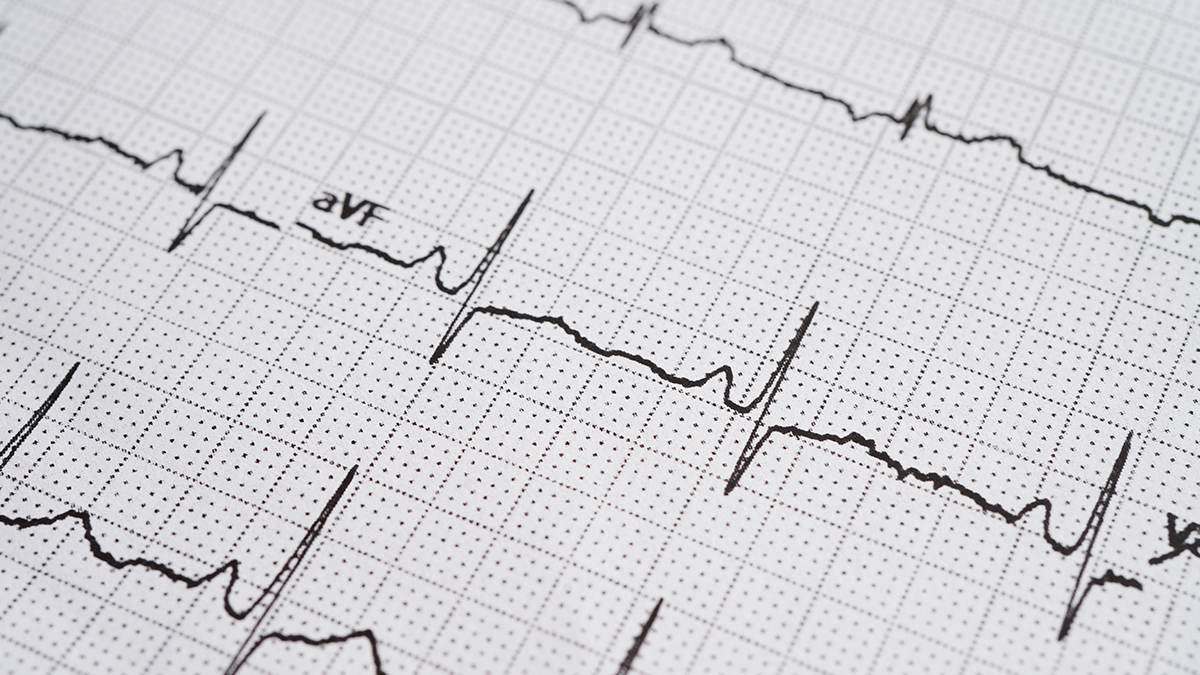
What Information Does An ECG Give About A Person?
An ECG reveals much more than just whether your heart is beating normally. The detailed information it provides helps build a comprehensive picture of your cardiovascular health and can guide further treatment decisions.
Immediate Health Status
- Current heart rate: Exactly how fast your heart is beating during the test
- Heart rhythm regularity: Whether your heartbeats are evenly spaced or irregular
- Electrical conduction: How well electrical signals are moving through your heart
Risk Assessment
An ECG helps doctors assess your risk for future heart problems. Certain patterns on an ECG might indicate you’re at higher risk for conditions like:
- Heart attacks
- Stroke
- Heart failure
- Sudden cardiac arrest
Response to Treatment
If you’re already receiving treatment for a heart condition, an ECG shows how well your treatment is working and whether any adjustments are needed to your medications or lifestyle recommendations.
Need for Further Testing
Sometimes an ECG reveals abnormalities that require additional investigation. Your doctor might recommend further tests such as:
- Echocardiogram (ultrasound of the heart)
- Stress testing
- Blood tests to check for heart damage markers (detect heart stress or injury quickly)
- 24-hour ECG monitoring (Holter monitor)
Physical Fitness Level
In some cases, an ECG can provide insights into your overall fitness level and how efficiently your heart works during normal daily activities.
This comprehensive information makes the ECG an invaluable tool for both diagnosing existing conditions and preventing future heart problems through early detection and appropriate treatment planning.

How Long Does An ECG Take?
One of the major advantages of an ECG is how quick and simple the procedure is. Understanding the timeline can help you plan your appointment and know what to expect.
Preparation Time: 5-10 Minutes
Before the actual ECG recording begins, there’s a brief preparation phase:
- You’ll be asked to remove clothing from your chest and sometimes arms and legs
- The healthcare professional will clean the areas where the electrodes will be placed
- 12 electrodes are carefully positioned on your chest, arms, and legs
- The positioning is important for accurate results, so the healthcare professional will take care to place them correctly
Recording Time: 30 Seconds to 2 Minutes
The actual ECG recording is remarkably quick:
- You’ll be asked to lie still and breathe normally
- The machine records your heart’s electrical activity for about 30 seconds to 2 minutes
- During this time, it’s important to remain as still as possible to avoid any interference with the reading
- You don’t need to hold your breath or do anything special
Total Appointment Time: 15-20 Minutes
From start to finish, a standard ECG appointment typically takes:
- 15-20 minutes in total, including preparation, recording, and cleanup
- Most of this time is spent preparing and positioning the electrodes correctly
- The actual test itself is very brief
Immediate Results
One of the benefits of an ECG is that the results are available immediately. Your doctor or the healthcare professional performing the test can see the results as soon as the recording is complete, though they may want to review the results in detail before discussing them with you.
If you’re having an ECG as part of a private GP appointment in Milton Keynes, your doctor can often discuss the results with you during the same visit, helping you understand what the test shows and whether any follow-up is needed.
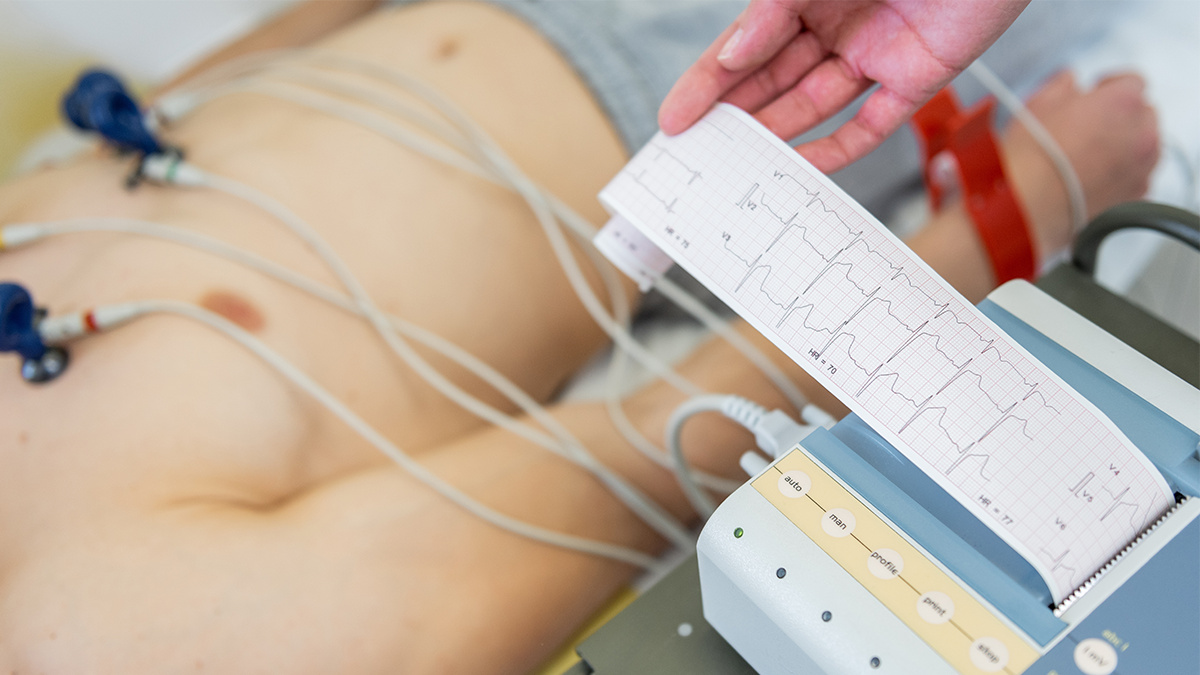
How To Sleep With A 24-Hour ECG
Sometimes a standard ECG isn’t enough to capture heart rhythm problems, especially if symptoms come and go. In these cases, your doctor might recommend a 24-hour ECG, also called a Holter monitor. The Mayo Clinic explains that a Holter monitor is a device you wear that records your heart’s electrical activity for 24 to 48 hours, providing more insight than a standard ECG.
It takes some getting used to sleeping with a 24-hour ECG, but with the correct planning, you can ensure reliable readings and have a restful night’s sleep.
Before Bedtime Preparation
- Secure the Monitor: The best spot to position the Holter monitor is at the top of your chest, just below your collarbone and toward the middle. Use an extra strap around your back to prevent the monitor from shifting during sleep as you move.
- Check Electrode Connections: Before lying down, gently press each electrode to ensure they’re securely attached to your skin. Loose electrodes can cause gaps in the recording or false readings.
- Plan Your Sleep Position: Consider how you normally sleep and think about positions that will be most comfortable while wearing the monitor.
Sleeping Tips
- Sleep on Your Back: This is often the most comfortable position when wearing a Holter monitor, as it prevents pressure on the device and reduces the risk of electrode displacement.
- Use Extra Pillows: Prop yourself up slightly with pillows to prevent rolling onto the monitor during the night.
- Avoid Your Stomach: Sleeping face-down can put pressure on the electrodes and potentially cause them to come loose.
- Secure Loose Wires: Avoid placing anything heavy on top of the leads/wires to prevent disconnections. Tuck wires gently under your sleep clothes to prevent tangling.
What to Avoid
- Don’t remove the monitor or electrodes while sleeping
- Avoid electric blankets, which can interfere with the recording
- Don’t get the monitor wet – take showers before the monitoring period begins
- Avoid activities that might cause excessive sweating, which can loosen electrodes
Managing Discomfort
If the monitor feels uncomfortable during the night:
- Place a thin cloth between your skin and the monitor to reduce irritation
- Adjust your position gradually rather than making sudden movements
- Remember that the discomfort is temporary and the information gathered is valuable for your health
Recording Your Sleep
Keep a diary of your sleep quality and any symptoms you experience during the night. This information helps your doctor interpret the ECG results more effectively.
![]()
Frequently Asked Questions About ECGs
Q: Is an ECG painful?
A: No, ECGs are completely painless. The electrodes simply stick to your skin and detect your heart’s natural electrical activity. You won’t feel anything during the test except the slight coolness of the electrode gel.
Q: Do I need to prepare for an ECG?
A: Very little preparation is needed. Wear loose, comfortable clothing that can be easily removed from your upper body. Avoid lotions or oils on your chest area as they can interfere with electrode adhesion.
Q: Can an ECG detect all heart problems?
A: While ECGs are excellent for detecting rhythm problems and some structural heart issues, they can’t detect all heart conditions. The British Heart Foundation provides detailed information about what ECGs can and cannot detect. Some problems only show up during exercise or over longer periods, which is why your doctor might recommend additional tests.
Q: What happens if my ECG is abnormal?
A: An abnormal ECG may not always indicate a significant cardiac condition. ECG readings can be influenced by a variety of circumstances, and your doctor will take these into account in addition to your symptoms and medical background. To obtain a full understanding of your heart health, you may require more testing or monitoring.
Q: How often should I have an ECG?
A: The frequency depends on your individual risk factors and medical history. People with existing heart conditions might need regular ECGs, while healthy individuals might only need them as part of routine health screening or when symptoms develop.
Q: Can I exercise before an ECG?
A: Since intense exercise might alter your heart rate and perhaps impair the results, it is better to avoid it for a few hours prior to your ECG. Depending on the purpose of the test, your doctor will provide you with detailed instructions.
Q: What if I’m claustrophobic?
A: ECGs are performed in open rooms with no enclosed spaces, so claustrophobia shouldn’t be an issue. The test is very quick, and you can talk to the healthcare professional throughout the procedure.
Q: Can medications affect my ECG?
A: Yes, some medications can influence ECG results. Tell your doctor about all medications, supplements, and herbal remedies you’re taking before your ECG.

Taking Control of Your Heart Health
Understanding what is an ECG and its role in heart health assessment empowers you to take proactive steps in managing your cardiovascular wellbeing. Whether you’re experiencing symptoms that concern you or simply want to ensure your heart is healthy, an ECG provides valuable insights that can guide your healthcare decisions.
The combination of ECGs being quick, painless, and immediately informative makes them an excellent first step in heart health assessment. When you choose a private GP in Milton Keynes for your heart health concerns, you’re ensuring prompt access to this important diagnostic tool along with expert interpretation and personalised care planning.
Keep in mind that heart health is something that should not be put off. Don’t put off seeing a doctor for weeks if you’re suffering from symptoms like palpitations, shortness of breath, chest pain, or inexplicable lethargy. The results of heart diseases can be greatly impacted by early detection and intervention.
At Private Doctors MK, we understand that your heart health concerns can’t wait. Our experienced doctors provide comprehensive cardiovascular assessments, including ECGs, in a comfortable, supportive environment without lengthy waiting times. We’re here to provide you with the answers, reassurance, and expert care you need to maintain optimal heart health.
Don’t let concerns about your heart health keep you awake at night. Contact us today to arrange your consultation and take the first step toward better cardiovascular health with prompt, professional care that puts your well-being first.



